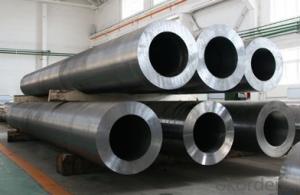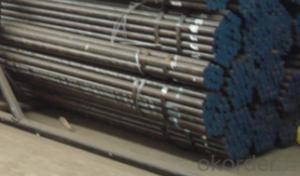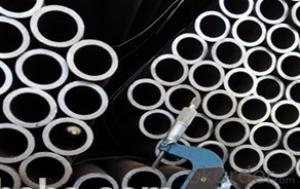Cold Drawn Carbon Steel Seamless Pipe CR50MG CNBM
- Loading Port:
- Qingdao
- Payment Terms:
- TT OR LC
- Min Order Qty:
- 10 pc
- Supply Capability:
- 30 pc/month
OKorder Service Pledge
OKorder Financial Service
You Might Also Like
Quick Details
| Thickness: | 1.2 - 20 mm | Section Shape: | Round | Outer Diameter: | 12.7 - 168 mm |
| Secondary Or Not: | Non-secondary | Application: | Boiler Pipe | ||
| Technique: | Cold Drawn | Certification: | PED | Surface Treatment: | oil coating |
| Special Pipe: | Thick Wall Pipe | Alloy Or Not: | Is Alloy | ASTM A213: | T2,T5,T9,T11,T12,T22,T23,T91,T91 |
| ASTM A335: | P1,P2,P5,P9,P11,P12,P22,P23,P91,P92 | DIN17175: | 15Mo3,10CrMo910,12CrMo195,13CrMo44 | Grade: | 12Cr1MoV,Cr5Mo,Cr9Mo,12Cr1MoVG,Cr5MoG,A335 P11,A335 P5,A335 P9,A335 P1,A213,A192,A210,A335 P12,A335 P23,St35.8,Cr-Mo alloy,A53-A369,ST35-ST52 |
| Standard: | BS 3059-2,DIN EN 10216-1-2004,DIN 17175,ASTM A213-2001,ANSI A210-1996,ASTM A179-1990,BS,DIN,ASTM |
Packaging & Delivery
| Packaging Detail: | Seaworthy export packing |
| Delivery Detail: | 45 Days |
Specifications
Standard:ASTM A179,DIN17175
Material:SA179,ST35.8
Size:12*1.2-168*20
Manufacture:cold drawn
Heat treating: normalized
Product Description
Commodity: cold drawn carbon steel seamless pipe
Standard&material: ASTM A213 T2,T5,T9,T11,T12,T22,T23,T91,T92, ASTM A335 P1,P2,P5,P9,P11,P12,P22,P23,P91,P92, DIN17175 15Mo3,10CrMo910,12CrMo195,13CrMo44, and equivalent standard and material.
Size range: 12mm*1.2mm - 168mm*20mm
Manufacture method: cold rolled, cold drawn
Delivery condition: Normalized, Normalized and Tempered.
Mill test certificate as per EN10204 3.1B is available.
Third party inspection is acceptable.
Tubes will be ECT+UT.
Packaging & Shipping
Packing: tubes will be packed in bundles tied with steel strips.
Oil coating,varnish,or black painting to be confirmed.
End plastic caps to be confirmed.
External packing by knit bags.
Marking: to be confirmed.
- Q:What is the minimum temperature that steel pipes can handle?
- The minimum temperature that steel pipes can handle depends on the specific grade and composition of the steel. Generally, steel pipes can handle extremely low temperatures without experiencing any significant issues. In fact, many types of steel are specifically designed to withstand extremely cold temperatures, making them suitable for various applications in industries such as oil and gas, construction, and cryogenics. However, it is important to note that at extremely low temperatures, steel may become more brittle, which can affect its mechanical properties. Therefore, it is essential to carefully select the appropriate grade of steel and consider any specific requirements or limitations for the intended application when determining the minimum temperature that steel pipes can handle.
- Q:What is the difference between steel pipes and copper-nickel pipes?
- The main difference between steel pipes and copper-nickel pipes lies in their composition and characteristics. Steel pipes are primarily made of iron and carbon, whereas copper-nickel pipes are made of a combination of copper and nickel with trace amounts of other elements. Steel pipes are known for their strength and durability, making them suitable for a wide range of applications, particularly in industries where high pressure and temperature conditions are present. Steel pipes are also relatively cost-effective and have good corrosion resistance, especially when coated or galvanized. On the other hand, copper-nickel pipes are highly resistant to corrosion and have excellent heat transfer properties. They are commonly used in marine environments due to their resistance to saltwater corrosion. Copper-nickel pipes also exhibit antimicrobial properties, making them suitable for applications in healthcare and food processing industries. However, copper-nickel pipes are generally more expensive than steel pipes. In summary, steel pipes are valued for their strength and affordability, while copper-nickel pipes offer superior corrosion resistance and heat transfer properties, but at a higher cost. The choice between the two depends on the specific requirements of the application.
- Q:How are steel pipes used in hydroelectric power plants?
- Steel pipes are used in hydroelectric power plants to transport water from the reservoir to the turbines. These pipes are able to withstand high pressure and ensure a reliable flow of water, which is crucial for the efficient operation of the turbines. Additionally, steel pipes are also used for the construction of penstocks, which control the flow of water and direct it towards the turbines.
- Q:Are steel pipes suitable for semiconductor manufacturing plants?
- Yes, steel pipes are appropriate for use in semiconductor manufacturing plants. Steel pipes are renowned for their durability, strength, and resistance to corrosion, making them an exceptional option for a variety of industrial applications, including semiconductor manufacturing. Within semiconductor manufacturing plants, a range of chemicals and gases are employed throughout the production process. Steel pipes possess a high degree of resistance to corrosion and can endure the harsh chemicals and gases typically encountered in semiconductor manufacturing environments, thereby ensuring the integrity and longevity of the piping system. Moreover, steel pipes are capable of withstanding high-pressure conditions, which are frequently required in semiconductor manufacturing plants. They exhibit excellent mechanical properties and can endure heavy loads and stress, rendering them dependable for the transportation of fluids and gases under high pressure. Another benefit of steel pipes is their adaptability in terms of size and shape. Semiconductor manufacturing plants often necessitate a complex and intricate piping system to accommodate diverse processes and equipment. Steel pipes can be easily customized and fabricated to meet specific requirements, enabling efficient and seamless integration into the infrastructure of the plant. In summary, steel pipes possess the necessary qualities and characteristics for use in semiconductor manufacturing plants. Their durability, resistance to corrosion, high-pressure capabilities, and flexibility make them a suitable choice for the transportation of chemicals and gases in this industry.
- Q:Fastener type steel pipe scaffold external parts name
- Even the wall piece the upright rod is connected with the main structure together, available steel tube, fastener or embedded part. Rigid wall, also can be used as a flexible reinforced wall connecting piece of the tie bar. , 5.The base in the form of plug-in and coat type two, inserted a D1 diameter rod diameter than 2mm, diameter D2 rod diameter than 2mm type jacket.
- Q:How are steel pipes connected to other plumbing components?
- Steel pipes are typically connected to other plumbing components through various methods such as threaded connections, welding, or using compression fittings.
- Q:Are steel pipes suitable for use in mining applications?
- Yes, steel pipes are suitable for use in mining applications. Steel pipes are known for their high durability, strength, and resistance to corrosion, making them ideal for mining operations where they may be exposed to harsh conditions such as abrasive materials, high pressure, and extreme temperatures. Additionally, steel pipes can be easily welded and customized to meet specific mining requirements, making them a reliable choice for transporting fluids, gases, and materials in mining operations.
- Q:What are the different types of steel pipe coatings for nuclear power plants?
- There are several types of steel pipe coatings used in nuclear power plants, including epoxy coatings, polyethylene coatings, fusion bonded epoxy coatings, and coal tar enamel coatings. These coatings are applied to steel pipes to provide protection against corrosion, enhance durability, and maintain the integrity of the pipes in the demanding environment of nuclear power plants.
- Q:Can steel pipes be coated for additional protection?
- Yes, steel pipes can be coated for additional protection. Coating the pipes helps to prevent corrosion, enhance durability, and improve resistance to various environmental factors.
- Q:Are steel pipes suitable for underground industrial waste disposal?
- Yes, steel pipes are generally suitable for underground industrial waste disposal. Steel pipes are durable, resistant to corrosion, and can withstand high pressure, making them a reliable choice for transporting and disposing of industrial waste underground. Additionally, steel pipes have a long lifespan and can be easily maintained, reducing the risk of leaks or contamination.
1. Manufacturer Overview |
|
|---|---|
| Location | |
| Year Established | |
| Annual Output Value | |
| Main Markets | |
| Company Certifications | |
2. Manufacturer Certificates |
|
|---|---|
| a) Certification Name | |
| Range | |
| Reference | |
| Validity Period | |
3. Manufacturer Capability |
|
|---|---|
| a)Trade Capacity | |
| Nearest Port | |
| Export Percentage | |
| No.of Employees in Trade Department | |
| Language Spoken: | |
| b)Factory Information | |
| Factory Size: | |
| No. of Production Lines | |
| Contract Manufacturing | |
| Product Price Range | |
Send your message to us
Cold Drawn Carbon Steel Seamless Pipe CR50MG CNBM
- Loading Port:
- Qingdao
- Payment Terms:
- TT OR LC
- Min Order Qty:
- 10 pc
- Supply Capability:
- 30 pc/month
OKorder Service Pledge
OKorder Financial Service
Similar products
New products
Hot products
Related keywords































